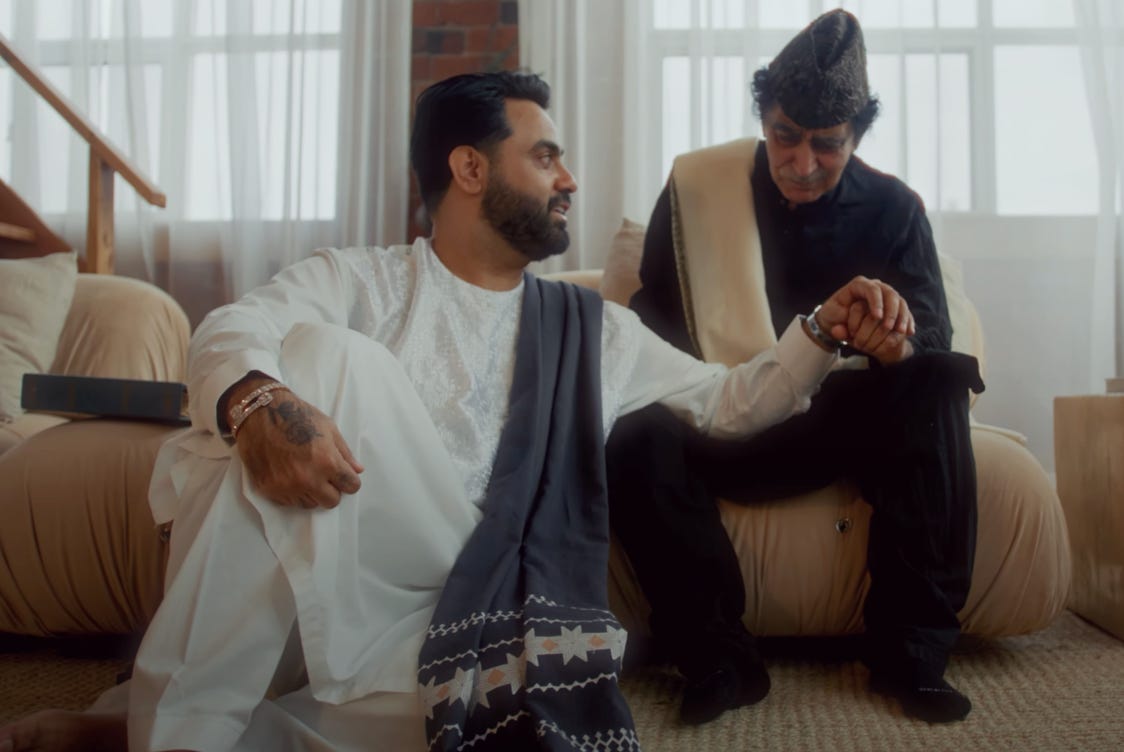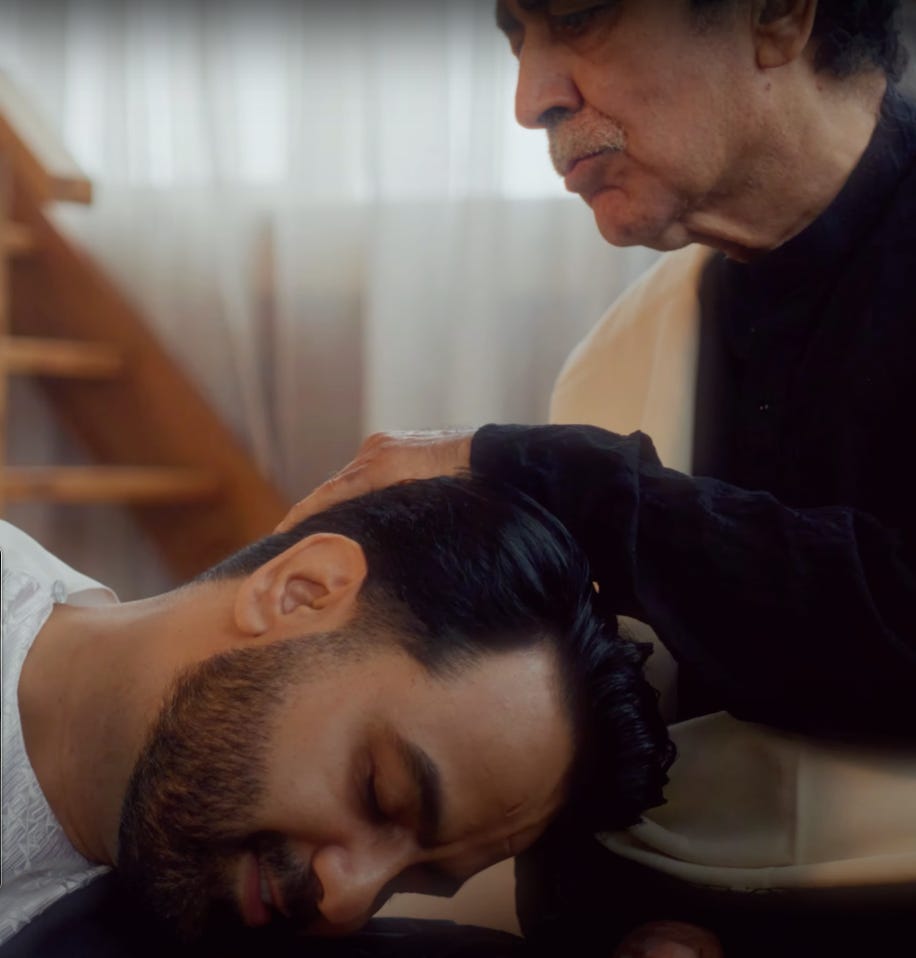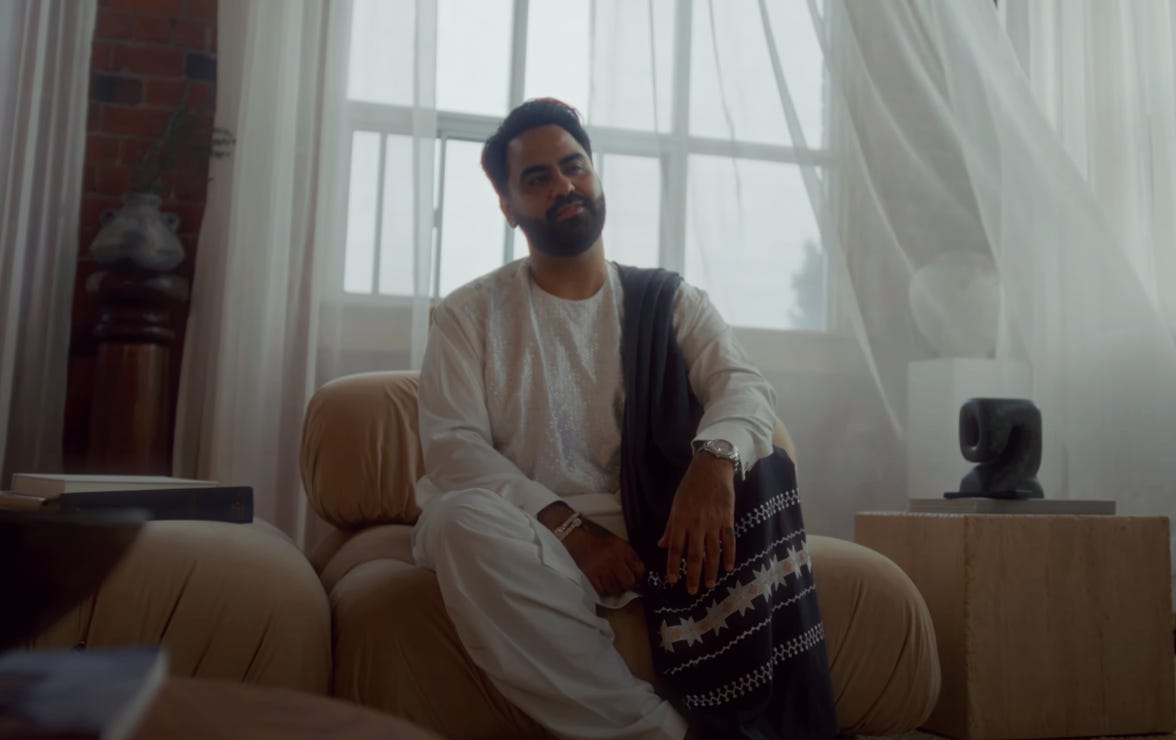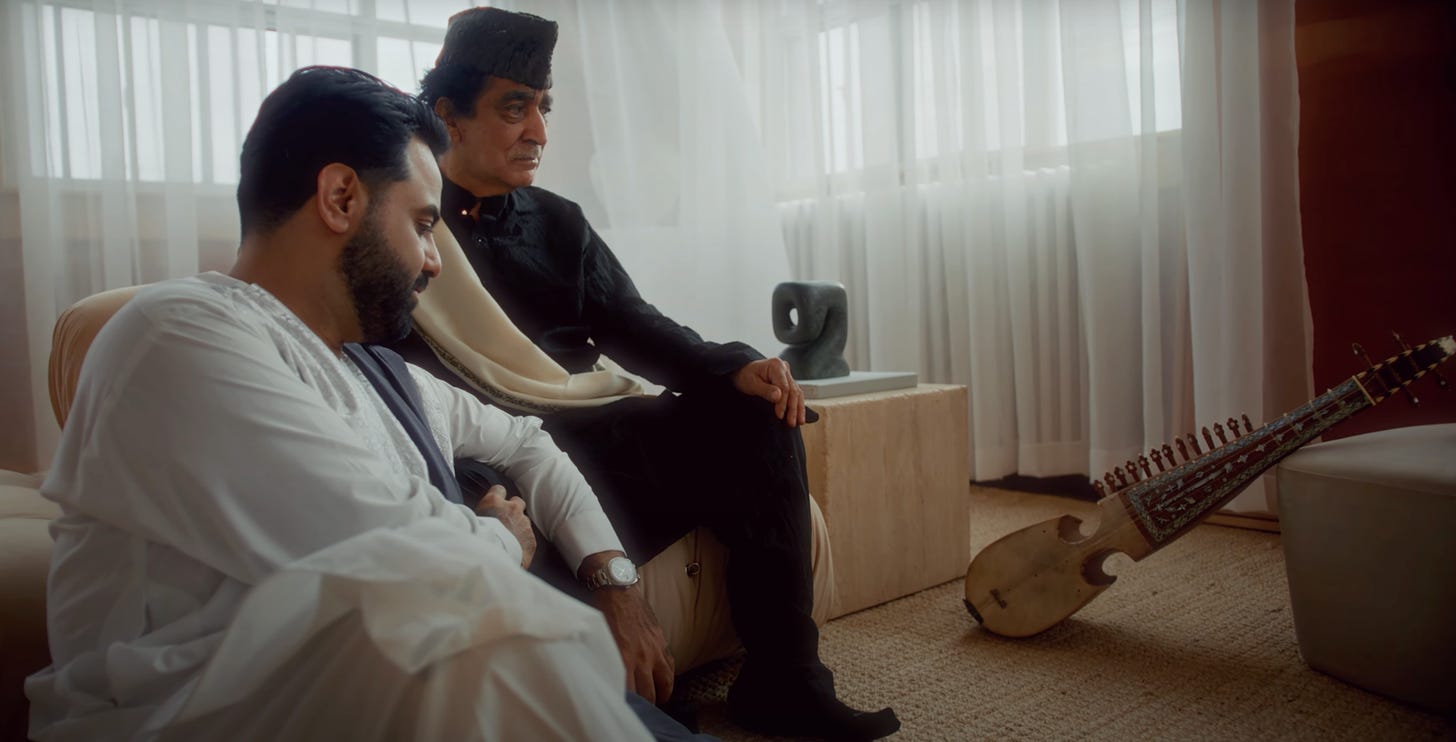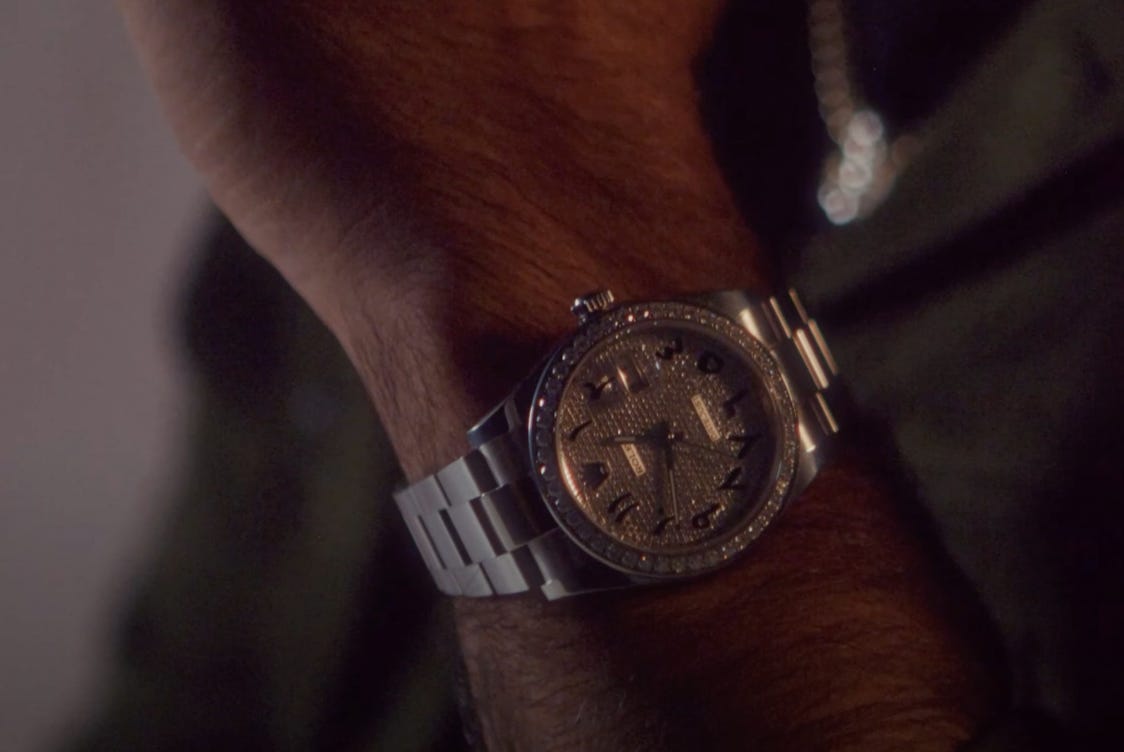“Today, with the release of the song ‘Padar,’ I feel like the luckiest child on Earth. I am fortunate to have the shadow of my father over me and my children, and I am lucky to have the chance and opportunity to serve a man who has dedicated his entire fruitful life to serving his homeland, people, family, and children.” - Qais Ulfat
The father-son bond is a powerful theme that's been explored for ages, in real life and in stories from all around the world. For instance, in ancient Greek plays, you have intense and dramatic stories like that of Oedipus and his father, which are full of twists and emotions. Then, in the epic Persian tale of the Shahnama, there's another unforgettable story where a father and son’s lives are entangled in a tragic misunderstanding. These stories from different cultures highlight the depth and complexity of the father-son relationship, showing us that this bond has always been central to our human experience.
Now, my relationship with my own father is a bit like those epic stories. But it’s also not that simple. We don’t have that picture-perfect kind of relationship you might see in movies or read in books. For us, it’s more about trying to get along. It’s a pragmatic kind of relationship, if you know what I mean. We both see and experience the world differently. For example, I never really got to say ‘Padar jan’ to him, a sweet way of saying ‘dad’ in Persian. Our relationship has always been more formal, kind of like walking on eggshells. It’s probably an understatement to say it’s been bit of a struggle to connect. We’re like two pieces from different jigsaw puzzles, trying hard to fit into one picture. All in vain. There’s this awkward and uncomfortable emotional distance between us, a gap that I’ve never truly been able to bridge, no matter how much I tried. Our conversations are often formal, lacking the warmth and ease you’d expect between father and son. It’s like there’s an invisible wall that neither of us knows how to tear down.
Philosophically and politically, we’re on different planets. I often find myself on one side of an argument, while he is on the complete opposite. These disagreements aren’t just about differing opinions; they feel deeper, almost fundamental, about how we see the world. It's as if we are speaking different languages, unable to understand each other’s perspectives. This has made our relationship even more challenging, adding layers of misunderstanding, disconnecting us even further.
“If I were to tell you about my father's role in my life and in shaping me as ‘Qais Ulfat,’ I might need the rest of my life to write and write about it to do justice to even one day's worth of love from this venerable and precious wise man.” - Qais Ulfat
Then, I see someone like Qais Ulfat and his father, and I immediately feel envious. In his latest song ‘Padar,’ he portrays this beautiful, almost sacred bond with his father. The lyrics, the emotions, the respect, it's all so evident and touching. It makes me wonder what it would be like to have that kind of connection. To look at my father and see not just a parent, but a guide, a friend, a mentor. To have conversations that aren’t just exchanges of words but are filled with understanding and mutual respect.
Watching Qais with his father, singing about him being his sun, his angel, and the pillar of his life, is a stark reminder of what I’ve longed for but never really had. It’s a relationship that seems to transcend the usual barriers of ego, pride, and misunderstanding, blossoming into something genuinely beautiful. Their bond shows me what a father-son relationship can be, and it leaves me wondering about the potential of my own relationship with my father that remains unexplored, hidden beneath layers of unspoken words and unresolved differences.
“Just one small positive thought in the morning can change your whole day.” - Qais Ulfat
I’ve mentioned this in the past, but it I’ll repeat it once again: Qais Ulfat is an exceptionally talented singer whose artistry transcends cultural barriers, seamlessly blending modern sounds with traditional elements in his music. His voice is warm and captivating; there is raw emotion and refined skill in his voice which resonates with listeners from all walks of life. Qais’s dedication to his art is evident in every note he sings; each song is a testament to his deep respect for musical traditions and his innovative approach.
‘Padar,’ which is a heartfelt tribute to his father Ustad Ulfat Ahang highlights the deep connection between a son and his father that’s not just sung about but also visually represented in a striking way. Their choice of clothes, with Qais in a white ‘Peran tumban’ and Ustad Ulfat Ahang in black, both from Le Panah, is symbolic. The contrasting colours could represent the different stages of life and experiences, yet the black and white harmony in the video reflects the deep connection and understanding between them.
The music video for ‘Padar’ is set in a simple, intimate household environment, evoking a sense of warmth and familiarity. It enhances the song’s authenticity and draws the viewer into a space that feels sacred yet entirely accessible. Qais welcomes us into the heart of his family life, allowing us to witness the unspoken bond shared with his father. Every aspect of the video, from the arrangement of the room to the choice of colours, contributes to a serene and calming atmosphere. The colours are soft, creating a beautiful background that complements the emotional depth of the overall theme. In contrast to so many other music videos out there, this one doesn’t distract but rather deepens the impact. It directs our focus to the profound and relatable connection between father and son.
"Life is a beautiful symphony, and I'm just dancing to its melodious tunes.” - Qais Ulfat
In ‘Padar,’ Qais Ulfat masterfully infuses Afghan, Indian, and Western music influences, creating a sound that is both familiar and refreshing. The song opens with the warm sound of the flute and transitions after a few seconds into the soulful strains of the violin, setting a tone of deep emotion and introspection. The lightness of the flute’s tones provide a perfect counterbalance to the deeper strings and vocals. I personally love the sound of the violin. In ‘Padar’, the violin is a voice in itself, weaving through the melody, echoing the song’s themes of love, reverence, and familial bonds. The violin’s melancholic and comforting sound seamlessly merges with Qais’s voice and adds a layer of beauty to the track.
In addition, the Indian music influence brings a sense of timelessness, while the contemporary production techniques ensure the song feels current and relevant. This fusion is reflective of Qais Ulfat's approach to music as a whole. It’s Qais’s speciality. He respects and draws from the past but always forward looking, pushing boundaries, and blending worlds. In ‘Padar,’ every note, every instrument, and every beat comes together to create a musical experience that is rich both in heritage and innovation.
“If you don't build your dream, someone else will hire you to help them build theirs.” - Qais Ulfat
The song is not without its minor flaws. One notable aspect is the occasional appearance of Qais’s flashy watch, which feels somewhat out of place within the otherwise humble and intimate setting of the video. This element, albeit small, momentarily distracts from the song’s overall theme of simplicity and deep emotional connection. Additionally, some scene transitions in the music video seem a bit abrupt and disjointed, breaking the flow of the visual storytelling. In my view, these moments slightly disrupt the viewer’s immersion in the narrative, detracting from the otherwise seamless emotional journey the song takes us on.
Despite these points, ‘Padar’ remains a beautiful and moving tribute to the complexities and beauties of the father-son relationship. Its strengths far outweigh its shortcomings, making it a memorable and impactful piece in Qais Ulfat's repertoire.
For this I’d like to thank Qais Ulfat.
‘Padar’ hit me in a way I didn't expect. I am going to be honest. Watching and listening to Qais Ulfat's tribute to his father, I feel a mix of admiration and a bit of envy.
The song is a powerful reminder of what we have, and more so, what we could have.
Songs like ‘Padar’ have a universal appeal because they touch on something that’s at the core of us all, namely our relationships with our parents. They stir something deep within, bringing out feelings we might not even know we had.
Today, as I listen to ‘Padar,’ I reflect on my life. It makes me wonder about the potential for healing, understanding, and maybe even bridging the gap that exists between me and my father. Maybe, just maybe, this song could be a starting point for conversations I've never had, for understanding I've never reached. Perhaps it’s not too late for us to find some common ground, just like the beautiful relationship Qais Ulfat celebrates in his song.
Who knows.
I remain hopeful.
Link to the Jaad-e Maiwand Podcast: https://soundcloud.com/maiwandazary
Link to Asia Music Channel: https://www.youtube.com/@amctv





